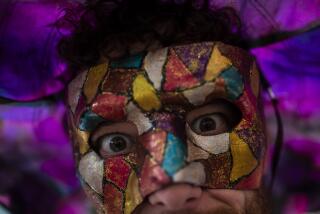Carnival-Like Celebration for Brazil
- Share via
RIO DE JANEIRO — In an all-day, three-city tour, Brazil’s World Cup soccer champions were swept up on the shoulders of this beleaguered nation in a massive outpouring of affection and admiration that stretched from the slums of Rio de Janeiro to the presidential palace in Brasilia.
The team, which won an unprecedented fourth World Cup, started in the northeastern beach city of Recife and reached Rio where it was greeted by 500,000 screaming, dancing, shouting, crying fans, more than one-third of the city.
The team plane was three hours late, because of excess baggage from last-minute shopping by players who decided to take advantage of their Los Angeles visit to buy televisions, stereos, refrigerators and washers that are outrageously expensive here.
As the plane touched down, Romario, the team’s star throughout the monthlong World Cup ‘94, hoisted the nation’s flag through the pilot window. Ricardo Rocha, the only player from the state, led the team off the plane, kissing the ground and hoisting the World Cup trophy into the air.
In Recife, where the governor had declared Tuesday a state holiday, the team mounted red fire engines for an 11-mile parade from the airport along the Praia da Viagem beach through a virtual sea of people.
Bands played and fireworks exploded overhead. Scores of mounted police struggled to keep back the enthusiastic fans who danced jubilantly, their small red, white, yellow and blue umbrellas held overhead, while shouting “Teatra Campeao! Teatra Campeao! (Four-time champion).”
People crammed into every available space along the parade route, clinging to balconies, hanging from flagpoles and hoisting themselves up trees. Mothers held babies in the air to behold their triumphant warriors for the historic moment, the first World Cup title in 24 years for a nation in which soccer is more religion than sport. Others held up pictures of Romario, who is being called “the little saint.”
Recife was where Brazil routed Bolivia, 6-0, last August in a morale-boosting qualifying victory that launched the team toward the World Cup finals. Brazil soccer officials pledged then to repay the loyal support they had received from Recife fans.
The stop, scheduled to last for an hour, went on for three. Players finally re-boarded their plane for the nation’s capital, Brasilia, where they were met by an even larger crowd, including President Itamar Franco and much of the nation’s Congress.
Mounting another set of fire engines and the same car used for a similar celebration when the team last claimed the Cup, team members hoisted a yellow crash helmet in honor of another Brazilian legend, race car driver Ayrton Senna, who was killed in a racing accident last May in Italy. They had dedicated their title to Senna.
They slowly made their way through another mass of fans adorned in green and yellow, Brazil’s national colors, before arriving at the Treis Podres where the president presented them with the Order of Sporting Merit, the nation’s highest such honor.
From the second-floor balcony of the presidential palace, the team members looked down into a near wall of green and yellow. Fans waved green and yellow flags, there were green and yellow hats, green and yellow shirts, green and yellow dogs, green and yellow cars--even green and yellow people.
In Rio, hundreds of thousands of fans, many of whom had been waiting for nearly 10 hours, stretched across the 20-mile parade route from the city’s airport to the beach community Leblon. The crowd was smaller than expected because of the team’s late arrival, partially because of a holdup by federal customs officials querying team members regarding their troublesome luggage.
The team, exhausted after 24 hours of travel, mounted another set of fire engines for a caravan through downtown, Flamengo, Copacabana, Ipanema and finally to Leblon. Samba bands, their drum corps beating out a pounding rhythm, lined the route, and fans began dancing and shouting in jubilation upon word that the team had finally touched down, seven hours late.
It was an especially sweet stop for the team’s other star, Bebeto, who would meet for the first time his son, born in Rio de Janeiro during the World Cup.
More to Read
Go beyond the scoreboard
Get the latest on L.A.'s teams in the daily Sports Report newsletter.
You may occasionally receive promotional content from the Los Angeles Times.







